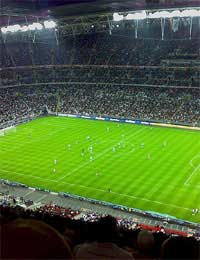Is Professional Football Really Becoming More Dangerous?

Football pundits have long enjoyed shaking their heads at the sight of professional players squaring up to each other, then giving a wry smile and referring to said incident being nothing more than “handbags”. And it has to be said, the sight of grown men pushing and shoving each other and mouthing obscenities does have something of an undignified squabble on the dance floor about it.
Unfortunately the opening to the 2010/11 season has been anything but laughable, particularly in the English Premiership where serious injuries appear to be occurring on a weekly basis.
It is off the field where the “handbags” analogy remains apt, with the protagonists flying in from all corners – former referees, former players, current players, managers, spectators on a host of radio phone-ins. Even the League Managers’ Association, the LMA, has become embroiled in the controversy.
Pantomime Villains
Of course the tabloid press do not need any excuse to pour over the minutiae of each individual incident, those who leave fellow professionals writhing on the ground nursing broken limbs and damaged tendons painted as the latter-day equivalent of pantomime villains.However, when the opportunity arises for everyone involved to take a collective breath, it is worth asking the pertinent question: is professional football more dangerous, say, than 10, 15 or 20 years ago? Or are we witnessing both managers and the baying media over-reacting to injuries that are arguably the inevitable consequence of a highly competitive contact sport?
Those subscribing to the latter viewpoint often point to the 1960s and 70s when it seemed that every top team had a “hard man”. Certainly the likes of Ron “Chopper” Harris and Norman “bites yer legs” Hunter didn’t acquire such tags by shirking the physical challenge, shall we say. The same could be said of Tommy Smith and Dave Mackay. Nevertheless, those with sufficiently long memories would struggle to recall bad injuries occurring with such regularity as they have done in the latter half of 2010.
Too Psyched Up?
So what is the problem? Are players too psyched up?; are the stakes, both sporting and financial, too high?; or has the much greater athleticism of the players and the increased speed of the game compared to past decades meant that impact between opponents is inevitably more violent, with a consequent increase in the gravity of a resulting injury?On balance, the answer has to lie with the latter. Inherently, professional football is not more violent than in the past; rather, in the Premiership in particular, where the accent is on pace and power, there is much less margin for error. It is this tiny margin that can be the difference between a player winning the ball cleanly and making accidental contact with one of his opponent’s limbs. Similarly, the increase in split-second decision making has meant when a player does lose his cool, there is no opportunity to think about his actions before he commits to a challenge.
Both players and managers need to be reminded of their responsibilities to both themselves and their fellow professionals, perhaps by adapting their approach to tackling to take account of the increased speed of the game. Otherwise reported threats to consider legal action against offenders may become a reality and the rule of law may become as much a part of the game as the offside rule.







